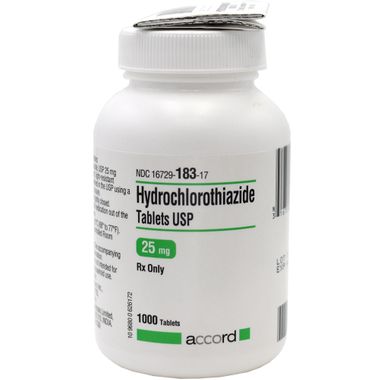SAVE 15% OFF 15% OFF Use Code EPX15 *
Hydrochlorothiazide for Pets - 25mg (per Tablet) - [Congestive Heart Failure]
- Description
- Directions
- FAQ
- Reviews
Description
Hydrochlorothiazide is a diuretic that works in the kidneys to remove excess fluid (water) and salt from the body. It is used in small animals to treat high blood pressure, heart failure, calcium-containing kidney or bladder stones, and a rare condition called nephrogenic diabetes insipidus (not diabetes mellitus or sugar diabetes).
How It Works
Hydrochlorothiazide is a diuretic that works in the kidneys to remove excess fluid (water) and salt from the body.
Indications
Hydrochlorothiazide tablets are indicated as adjunctive therapy in edema associated with congestive heart failure, hepatic cirrhosis, and corticosteroid and estrogen therapy. Hydrochlorothiazide tablets have also been found useful in edema due to various forms of renal dysfunction such as nephrotic syndrome, acute glomerulonephritis, and chronic renal failure.
Hydrochlorothiazide tablets are indicated in the management of hypertension either as the sole therapeutic agent or to enhance the effectiveness of other antihypertensive drugs in the more severe forms of hypertension.
Directions
Give as directed by your veterinarian. Always follow the instructions printed on the prescription label. While giving hydrochlorothiazide, allow your pet constant access to water. Giving hydrochlorothiazide with food may decrease the risk of stomach upset. Your pet may urinate more often while taking hydrochlorothiazide. Store at room temperature, protected from light and moisture.
Cautions:
Keep out of the reach of children and pets. Hydrochlorothiazide should be used with extreme caution if your pet also suffers from abnormalities in electrolyte or water balance, diabetes mellitus, hepatic function issues, hyperuricemia, lupus, or renal disease. Hydrochlorothiazide can interact with other medications, including corticosteroids, digoxin, insulin, non-steroidal anti-inflammatory drugs (NSAIDs), or vitamin D. Hydrochlorothiazide may influence laboratory results. Store at room temperature. Protect from light and moisture.
Side Effects:
Serious side effects can occur while taking hydrochlorothiazide. Contact your veterinarian if your pet experiences any of the following, as they could be signs of a serious side effect excessive thirst, fainting, head tilt, lack of urination, or muscle weakness. Overdoses of hydrochlorothiazide can occur. Contact your veterinarian immediately if you believe your pet has taken too much hydrochlorothiazide. Signs of an overdose include GI distress, coma, or seizures.
Storage:
Store at room temperature away from moisture and heat. Keep this medication away from children and pets.







